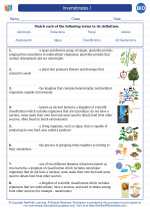Groundwater: Explanation and Study Guide
Introduction to Groundwater
Groundwater refers to the water that is found beneath the Earth's surface in the spaces between soil particles and cracks in rocks. It is a crucial natural resource that plays a significant role in sustaining ecosystems and human activities.
Formation of Groundwater
Groundwater is formed through the process of infiltration, where precipitation or surface water seeps into the soil and permeable rocks. Once below the surface, the water fills the spaces between particles and forms aquifers, which are underground layers of rock or sediment that can store and transmit water.
Importance of Groundwater
Groundwater is vital for various purposes, including drinking water supply, agricultural irrigation, industrial processes, and maintaining the flow of rivers and streams during dry periods. It also sustains wetlands and provides a habitat for unique ecosystems.
Study Guide
Here are some key points to focus on when studying groundwater:
- Understand the processes of infiltration and aquifer formation.
- Learn about the factors that affect groundwater recharge, such as precipitation, land use, and geological characteristics.
- Explore the methods used to extract and manage groundwater resources, including the potential environmental impacts.
- Examine the significance of groundwater in supporting ecosystems and human societies.
- Consider the challenges and potential solutions related to groundwater depletion and contamination.
Conclusion
Groundwater is a valuable resource that requires careful management to ensure its sustainability for future generations. By understanding its formation, importance, and potential threats, we can work towards preserving and utilizing groundwater in a responsible manner.
[Groundwater] Related Worksheets and Study Guides:
.◂Biology Worksheets and Study Guides High School. Invertebrates

 Worksheet/Answer key
Worksheet/Answer key
 Worksheet/Answer key
Worksheet/Answer key
 Worksheet/Answer key
Worksheet/Answer key
 Worksheet/Answer key
Worksheet/Answer key
 Worksheet/Answer key
Worksheet/Answer key
 Vocabulary/Answer key
Vocabulary/Answer key
 Vocabulary/Answer key
Vocabulary/Answer key
 Vocabulary/Answer key
Vocabulary/Answer key
